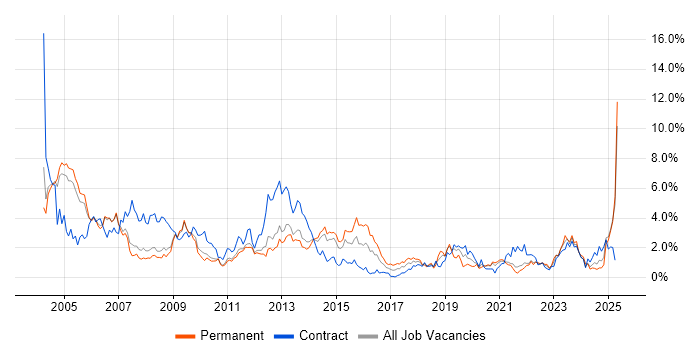The median Support Analyst salary in Sheffield is £36,500 per year, according to job vacancies posted during the 6 months leading to 7 May 2025.
The table below provides salary benchmarking and summary statistics, comparing them to the same period in the previous two years.
|
|
6 months to
7 May 2025 |
Same period 2024 |
Same period 2023 |
| Rank |
38 |
75 |
100 |
| Rank change year-on-year |
+37 |
+25 |
-9 |
| Permanent jobs requiring a Support Analyst |
3 |
11 |
6 |
| As % of all permanent jobs advertised in Sheffield |
1.05% |
1.03% |
0.65% |
| As % of the Job Titles category |
1.09% |
1.08% |
0.73% |
| Number of salaries quoted |
3 |
4 |
5 |
| 10th Percentile |
- |
£27,225 |
- |
| 25th Percentile |
£35,250 |
£29,813 |
£23,000 |
| Median annual salary (50th Percentile) |
£36,500 |
£35,500 |
£27,000 |
| Median % change year-on-year |
+2.82% |
+31.48% |
+20.00% |
| 75th Percentile |
£38,125 |
£40,250 |
£28,750 |
| 90th Percentile |
£38,350 |
- |
- |
| South Yorkshire median annual salary |
£36,500 |
£42,500 |
£27,500 |
| % change year-on-year |
-14.12% |
+54.55% |
+14.58% |
For comparison with the information above, the following table provides summary statistics for all permanent IT job vacancies in Sheffield. Most job vacancies include a discernible job title that can be normalized. As such, the figures in the second row provide an indication of the number of permanent jobs in our overall sample.
| Permanent vacancies in Sheffield with a recognized job title |
274 |
1,017 |
823 |
| % of permanent jobs with a recognized job title |
95.80% |
95.49% |
88.49% |
| Number of salaries quoted |
187 |
822 |
406 |
| 10th Percentile |
£29,000 |
£27,550 |
£24,575 |
| 25th Percentile |
£31,250 |
£36,813 |
£33,713 |
| Median annual salary (50th Percentile) |
£55,000 |
£47,500 |
£47,754 |
| Median % change year-on-year |
+15.79% |
-0.53% |
-9.04% |
| 75th Percentile |
£74,375 |
£65,000 |
£63,750 |
| 90th Percentile |
£82,500 |
£80,000 |
£71,550 |
| South Yorkshire median annual salary |
£50,000 |
£47,500 |
£45,000 |
| % change year-on-year |
+5.26% |
+5.56% |
-10.00% |

